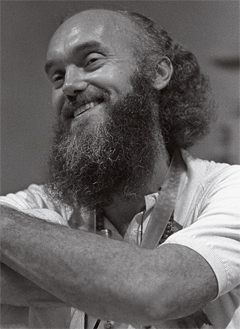
As I walked the long driveway to the Alpert family estate, I didn’t know what to expect. A friend had heard Ram Dass lecture at Columbia University and suggested that I go to New Hampshire to meet him. At the time I knew very little about Ram Dass except that he had recently returned from India, and that when he was known as Richard Alpert, he was a counter-culture figure who knew a lot about LSD. I also knew nothing about meditation, yoga, or Buddhism and was not the least bit interested in learning.
When I went to see Ram Dass, I had been depressed for more than a year. Like many in my generation, I had turned on, tuned in, and dropped out, but for me the promise of psychedelics had remained unfulfilled. Although I had many unusual and sometimes wonderful experiences, my personality had not changed. I was still fragile, fragmented, and easily overwhelmed by anxiety, guilt, and frustration. In short, I was a rather low-functioning and confused nineteen-year-old high school dropout.
The day after my friend suggested that I go to New Hampshire, I was on a bus leaving New York City. Even though I traveled through what turned out to be the blizzard of 1969, I naively expected Ram Dass to be surrounded by visitors. But as I entered his room, he was meditating alone, sitting cross-legged facing the opposite wall. Hearing me on the stairs, he stood up, motioned for me to pull up a cushion, made tea for both of us, and then sat on his futon a few feet in front of me.
Suddenly feeling quite nervous and unsure of why I had come, I asked a number of innocuous questions about Eastern philosophy that had no other purpose than to maintain a conversational chatter. After many pauses and awkward periods of silence, Ram Dass suggested that we play a game that he called “guts ball.” He explained that we would sit facing one another, maintaining direct eye contact. The “guts” part of the game would be that anytime either of us had a thought or feeling that we were reluctant to acknowledge or share, we would then say that thought or feeling – all the while maintaining eye contact.
Given my depression and overall level of defensiveness, it was surprising that I agreed to play the game. But there was something about Ram Dass that cut through my isolation; sitting with him I felt relaxed, excited, challenged, and safe all at the same time.
For the next hour and a half, thoughts and feelings emerged, sometimes in rapid succession. As I became aware of uncomfortable thoughts and emotions, my reactions were first regret or shame – and then panic. How could I have those awful thoughts and feelings, sitting there looking directly at Ram Dass, while maintaining the pretense of equanimity? The answer, of course, was that I could not. As the minutes passed, I would eventually summon the courage to say whatever it was that I did not want to say, fully expecting Ram Dass to be angry, disappointed, or bored. Instead, his gaze communicated a very powerful and profound sense of understanding and acceptance.
As the minutes passed, I began, ever so slowly, to internalize Ram Dass’s compassionate acceptance and then direct that acceptance toward those thoughts and feelings that I wanted to disown. And even though this capacity for self-directed empathy quickly faded after leaving Ram Dass’s meditation room, I remembered what it felt like and I wanted to become the kind of person who could experience that again. That curiosity led to the development of a consistent meditation practice and, eventually, to a clinical psychology practice as well.
Ram Dass did not ask or expect me to change into some idealized version of myself, but rather he provided a context in which I might develop insight and compassion. In a remarkably brief period of time, Ram Dass did what all good teachers do: he first became a mirror and then he became a finger pointing at the moon. For the next several years, I spent as much time as I could with Ram Dass, going to darshans in New York, New Hampshire, Boston, Kansas City, and even India. During my time with Ram Dass, I learned to sit, to chant, and eventually, to follow my own path. I will always be grateful for his teaching. ▼